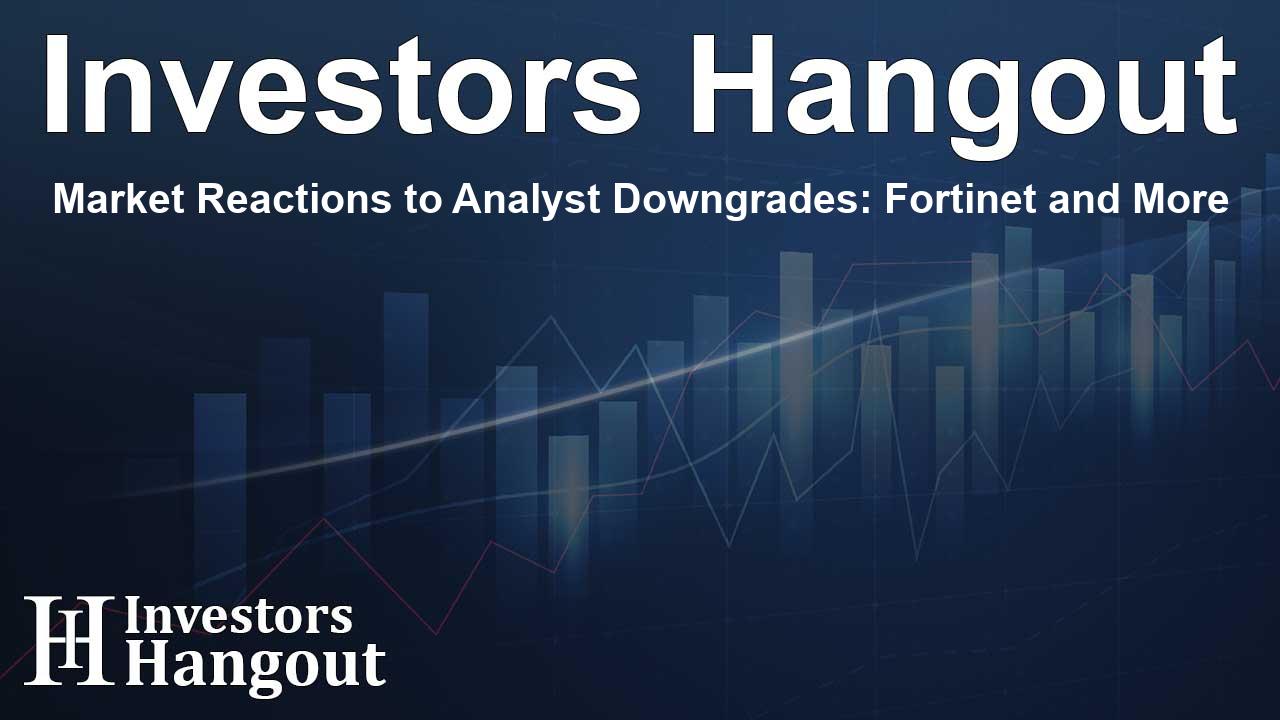Market Reactions to Analyst Downgrades: Fortinet and More

Recent Analyst Downgrades Impacting Major Stocks
In the ever-evolving world of finance, stock ratings from analysts can significantly influence investor decisions. Recent downgrades by top Wall Street analysts have prompted a closer examination of stocks like Fortinet Inc. As investors seek clarity on these ratings, understanding the reasoning behind them is crucial for making informed decisions.
Fortinet Inc.'s Downgrade Explained
Morgan Stanley analyst Meta Marshall recently downgraded Fortinet, Inc. (NASDAQ: FTNT) from Equal-Weight to Underweight. Along with this rating cut, the price target has been lowered from $78 to $67. The stock closed at $78.77 on the previous trading day, indicating some volatility that investors should watch closely.
Market Sentiment for Fortinet
The downgrade by Morgan Stanley raises questions about Fortinet's growth potential and market position. Investors should consider analyst insights into the competitive landscape of cybersecurity and how Fortinet fits into it. Analysts believe that Fortinet faces challenges in maintaining its growth trajectory amid increasing competition.
Other Downgrades to Note
Alongside Fortinet, several other notable companies have also received downgrades that investors should be aware of:
- IREN Limited (NASDAQ: IREN) was downgraded from Buy to Hold by analyst Stephen Glagola of Jones Trading. The stock closed at $26.48.
- Macquarie's Andrew Bowler downgraded Newmont Corporation (NYSE: NEM) from Outperform to Neutral, setting a price target of $72. Newmont shares ended at $74.40.
- Fortive Corporation (NYSE: FTV) has also seen scrutiny, with Morgan Stanley analyst Chris Snyder downgrading it from Overweight to Equal-Weight and reducing the price target significantly from $90 to $50. The stock closed at $47.86.
- Lastly, analyst Graham Doyle from UBS downgraded Fresenius Medical Care AG (NYSE: FMS) from Neutral to Sell. This stock closed at $25.70, reflecting market concerns about its long-term performance.
Investment Implications
These downgrades signal potential shifts in the market's perception of these companies. Analyzing the underlying factors that contribute to these ratings, such as financial reports and market conditions, can help investors make strategic decisions about their portfolios.
Should You Buy the Dip?
Amid these downgrades, questions arise about whether this is a buying opportunity for stocks like Fortinet. Understanding analyst perspectives and the factors behind their ratings can provide guidance. As an investor, always question the long-term growth potential versus immediate market reactions. Conducting thorough research is essential in these situations.
Conclusion: The Importance of Analyst Insights
Investor sentiment can sway significantly based on analysts' recommendations. While downgrades may raise red flags, they can also present strategic investing opportunities if approached thoughtfully. Observing the movements in the shares of Fortinet and others can offer valuable insights into broader market trends and investor behavior.
Frequently Asked Questions
1. What does it mean when a stock is downgraded?
A downgrade indicates that an analyst believes the stock will underperform compared to the market or other stocks in the same category, often resulting from unfavorable company news or market conditions.
2. How often do analyst ratings change?
Analyst ratings can change frequently, particularly during earnings seasons or after major company announcements, reflecting changes in an analyst's perspective or new data.
3. Are downgrades a sign to sell?
Not necessarily. While downgrades can indicate potential issues, they may also present buying opportunities if the company's fundamentals remain strong.
4. Should I follow analyst ratings for investing decisions?
While analyst ratings can provide valuable insights, it is essential to conduct your own research and consider multiple factors before making investment decisions.
5. What are the implications of downgrades on stock prices?
Downgrades often lead to short-term price declines as investor confidence may waver. However, the long-term impact depends on the company's fundamentals and market conditions.
About The Author
Contact Owen Jenkins privately here. Or send an email with ATTN: Owen Jenkins as the subject to contact@investorshangout.com.
About Investors Hangout
Investors Hangout is a leading online stock forum for financial discussion and learning, offering a wide range of free tools and resources. It draws in traders of all levels, who exchange market knowledge, investigate trading tactics, and keep an eye on industry developments in real time. Featuring financial articles, stock message boards, quotes, charts, company profiles, and live news updates. Through cooperative learning and a wealth of informational resources, it helps users from novices creating their first portfolios to experts honing their techniques. Join Investors Hangout today: https://investorshangout.com/
The content of this article is based on factual, publicly available information and does not represent legal, financial, or investment advice. Investors Hangout does not offer financial advice, and the author is not a licensed financial advisor. Consult a qualified advisor before making any financial or investment decisions based on this article. This article should not be considered advice to purchase, sell, or hold any securities or other investments. If any of the material provided here is inaccurate, please contact us for corrections.
